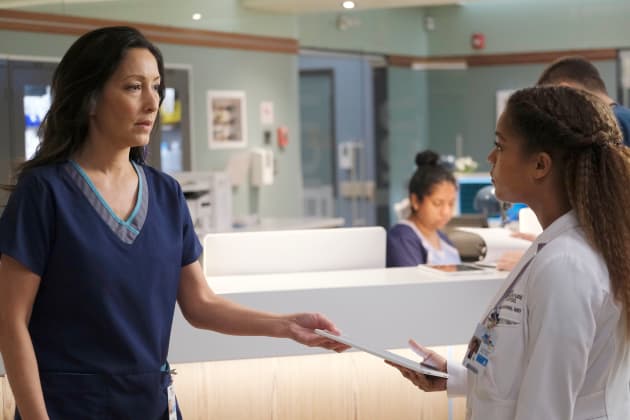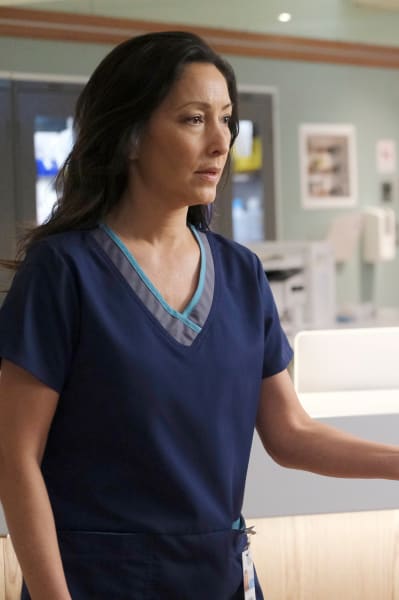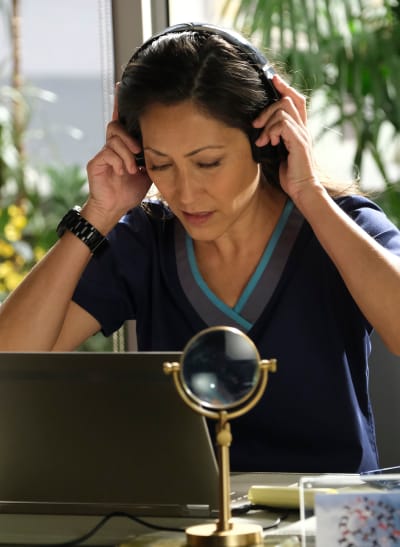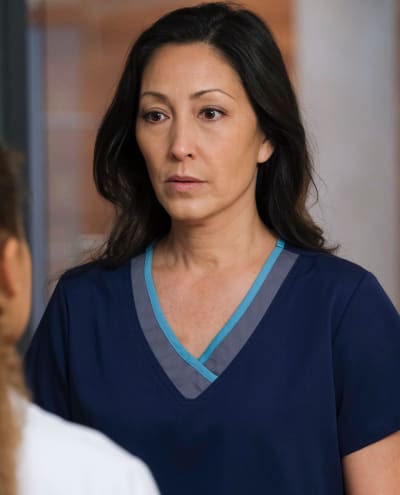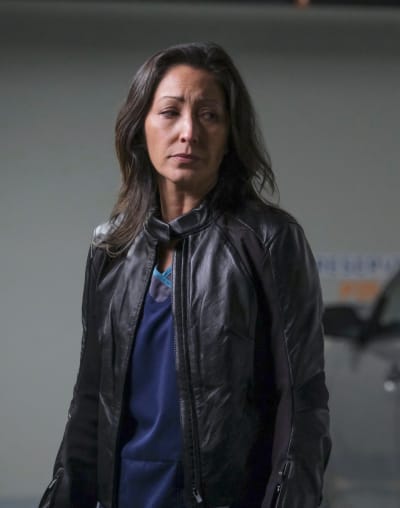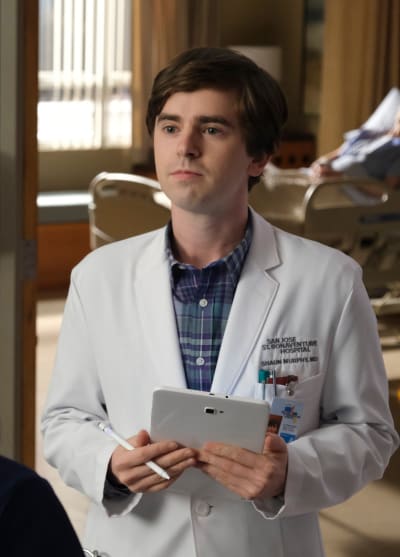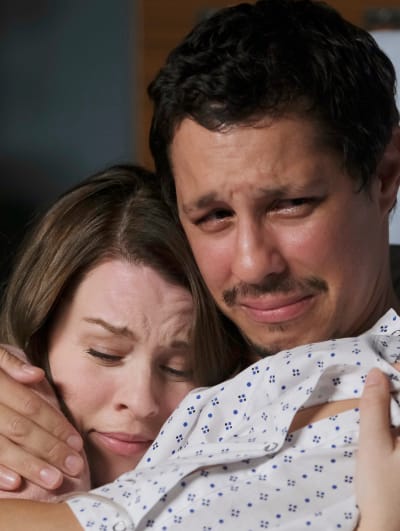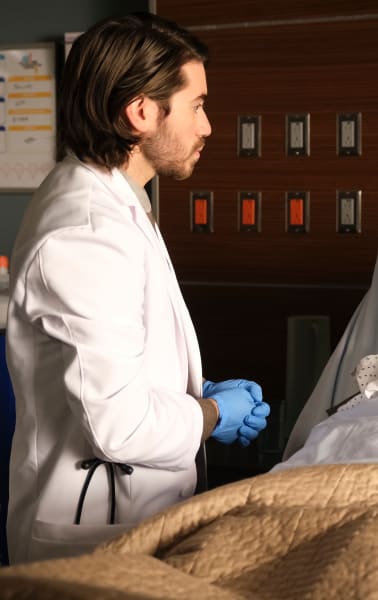Of all mental illnesses, PTSD is probably the one that TV has the hardest time getting right.
The Good Doctor Season 4 Episode 6 took a stab at it with a Lim-centered story that drew a clear parallel between Lim’s issues now that the most intense period of the COVID pandemic had passed and a patient who has severe PTSD after returning from Afghanistan.
If anything, the comparison was a bit too on the nose, but at least for once, we avoided stereotypes.
The way The Good Doctor showed Lim’s struggle was accurate, but at times it was confusing.
When Lim was in the throes of traumatic memory, it was hard to tell whether she was having a flashback to the past or simply walking around dissociated in the present.
There were several times when she went into a near trance, walking slowly around the hospital, and I assumed she was flashing back to the COVID pandemic, but it turned out she wasn’t.
The scenes were effective in what they set out to do, demonstrating Lim’s point of view as a person suffering from unacknowledged and undiagnosed PTSD in a way that is rarely shown on TV. But sharing Lim’s disorientation made me unsure of what was going on.
And what the hell was that cliffhanger?
If this were a different type of show, I’d think this was some sort of Sixth Sense send-up where Lim had actually died during the first bike ride, and the rest was all a dream.
But Rose’s empathic qualities is about as far as The Good Doctor is likely to get with paranormal stuff, Christina Chang isn’t leaving, and it would suck if they killed Lim off so soon after Melendez’s death.
The final scene did suggest Lim was having some sort of out-of-body experience, though she also might have just realized what a close call she just had. But all those audio flashbacks of “time of death” suggests she’s not in good shape.
My guess is that she’ll hover between life and death and, when she wakes up, finally decide to get some help.
Leaving that weirdness aside, I thought this was a powerful depiction of the different ways PTSD can manifest.
Most people are aware of PTSD-related flashbacks and that sufferers often dissociate, but there is so much more to this disorder than that.
Claire: What do you think of Asher?
Lim: He’s fine.
Claire: Too fine if you ask me.
Lim: I don’t have time for too fine.
Claire: He’s walking around like he didn’t just lose a patient.
Lim: Good, smiling releases serotonin even if you feel miserable.
Claire: Denial isn’t healthy.
Lim: Neither is dwelling on things you can’t change.
Lim’s short temper and insistence on just “getting over it” so that she could do her job were classic PTSD symptoms that many viewers may not have associated with the disease.
I also loved that they addressed the fact that this issue is partially physiological. PTSD affects a person’s neurology, not just their psychology. All mental disorders do — on one level, psychotherapy and other treatments are about changing brain chemistry — but it’s especially true for PTSD.
The traumatic incident or incidents disrupts the brain’s normal memory encoding process, which is what causes flashbacks.
Anyway, I was glad Claire told Lim that this wasn’t just a mental disorder, but also a physiological one and that PTSD was associated with an overactive amygdala.
It would have been interesting had they gone the route of radical pharmacological treatments, though.
Some research shows that psychedelic drugs and MDMA (Ecstacy) may help alleviate PTSD symptoms; however, since these are illicit drugs currently classified as having no medicinal purpose, it would be hard — and probably illegal — to treat a patient using this protocol.
That would have made for some fascinating drama that might have lasted a few episodes rather than the surgery being done so quickly.
But I really can’t complain. The Good Doctor’s sensitive depiction of PTSD was miles ahead of most other television series, so they can’t be faulted for missing an alternative storyline.
Andrews: Asking a resident to do a procedure she doesn’t feel comfortable with is bad form.
Lim: Oh my God, is there anyone who doesn’t have an opinion on who should do this abortion?
Lim’s impatience with the residents led to some particularly good drama, too.
The Jordan storyline brought up whether a doctor-in-training should be forced to do procedures that go against their religious beliefs.
Jordan wasn’t demanding the hospital not do abortions at all but didn’t want to be involved. Presumably, since she’s uncomfortable with the procedure, she won’t be going into practice in an area where she must do it.
So since that’s the case, should Lim have allowed Olivia to do the D & C instead?
It’s a tough call. The point of residency is to learn how to do all sorts of procedures that the doctor may never do once they are fully licensed. Many procedures make people uncomfortable for a variety of reasons.
And Lim was right that learning to put your personal feelings aside to help patients is vital.
Yet Jordan’s discomfort did nobody any good, and Lim ended up doing the procedure herself while having to reassure a nervous patient that everything was okay.
So Andrews might have had a point when he suggested that forcing a resident to abandon her religious beliefs to do a procedure she was uncomfortable with was a bad idea.
Of course, it turned out that Jordan had had an abortion herself, which was playing into her discomfort. Nice twist that made her more empathetic, but the point still stands.
Lim wasn’t the only one dealing with things she would rather forget. Jordan’s abortion was one example, and Asher’s difficulties after his patient’s death was another.
I loved how Lim encouraged Asher to try to move forward as a doctor even though her “get over it for the sake of the job” advice wasn’t healthy.
Asher: How do you get past it?
Lim: Cause that’s the job. You will always remember it, but eventually you will stop reliving it.
Asher: How can you be so sure?
Lim: Because you have to or you can’t be a surgeon. And I’m pretty sure that you’re a surgeon. Now get back to work.
Lim is at her best when she is mentoring the residents rather than snapping at them, and hopefully, she can get back to that once she heals some.
If the hour had one weakness, it was that Rose’s case was a side story.
Her claims that her symptoms were all due to other people’s emotional states was interesting, and the story had dramatic potential since Park believed Rose and Lim thought this empath business was nonsense.
I’d have liked to have more of a focus on attempting to treat her, and the doctors disagreeing on how to proceed because they didn’t see eye-to-eye on whether her symptoms were physical or psychological in origin.
As a side note, it was SO nice to have an entire hour without any ridiculous Shaun/Lea drama. Sure, there was a throughline about how Shaun wanted to buy Lea a present, but that was minimal, and we didn’t have to suffer through any stupid arguments or misunderstandings.
And Morgan only appeared for two seconds to make a drive-by criticism and disappear again. Double awesome!
Your turn, The Good Doctor fanatics! What did you think of the Lim-centered episode? Hit that big, blue SHOW COMMENTS button and let us know.
Want to refresh your memory first? Just watch The Good Doctor online right here on TV Fanatic.
The Good Doctor airs on ABC on Mondays at 10 PM EST/PST.
Jack Ori is a senior staff writer for TV Fanatic. His debut young adult novel, Reinventing Hannah, is available on Amazon. Follow him on Twitter.
